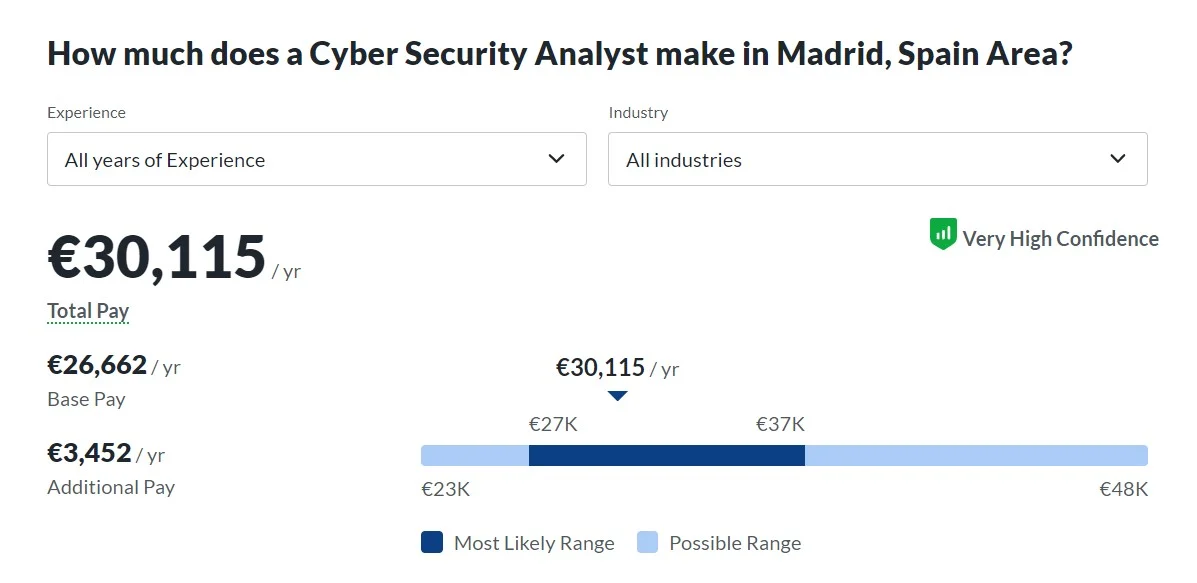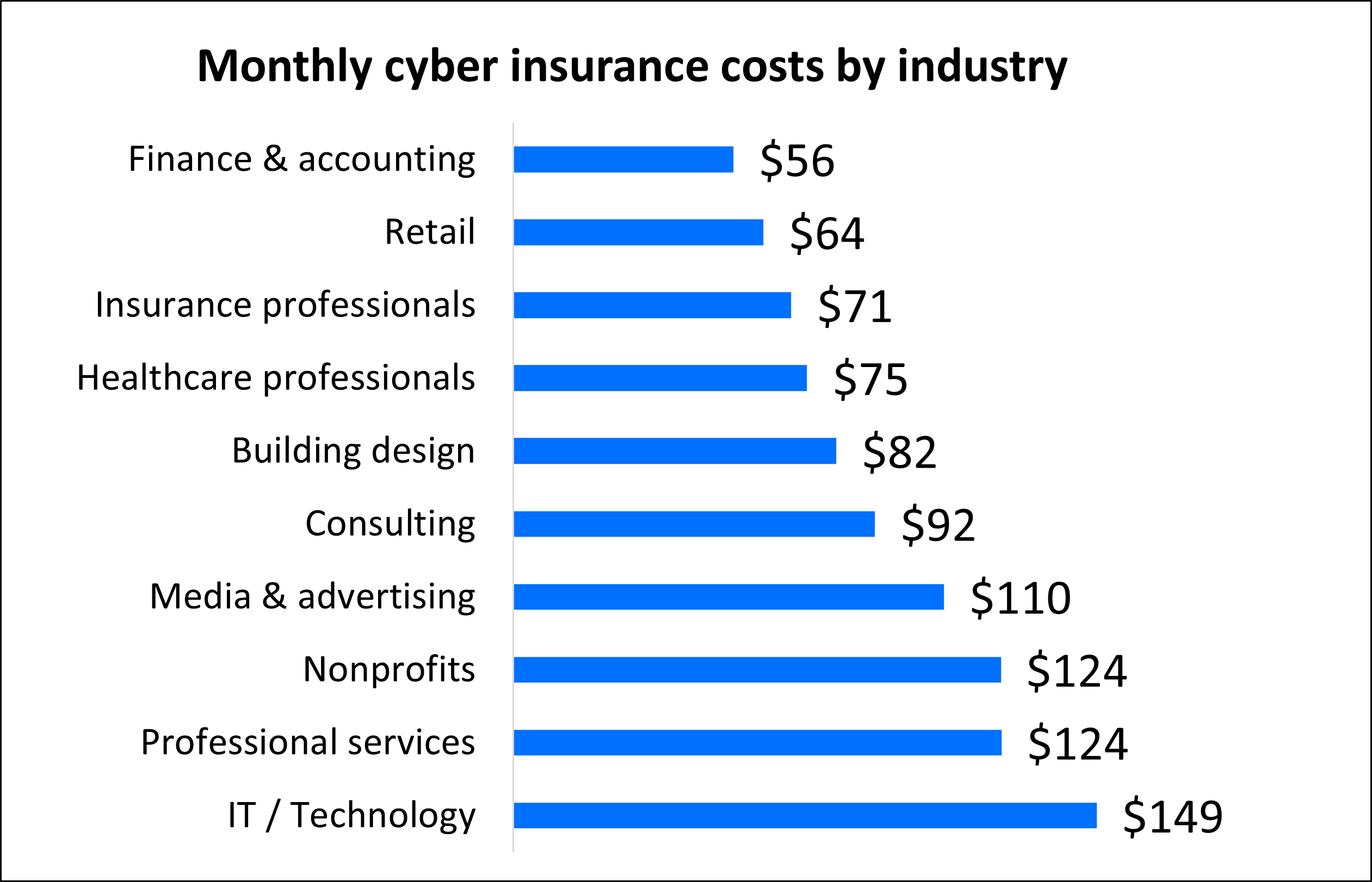Introduction
When it comes to career choices, one factor that often weighs heavily on our minds is the potential salary. In the ever-evolving field of cybersecurity, this concern is no different. With the increasing reliance on technology and the constant threat of cyberattacks, the demand for skilled professionals in this field continues to soar. As a result, cybersecurity has become a lucrative career choice for many.
However, the question remains: how much do professionals in cybersecurity actually make? The answer is not as straightforward as one might think, as numerous factors come into play when determining salary in this industry. It is important to consider experience, education, job position, industry, location, and certifications.
This article aims to shed light on the various factors that influence salary in the cybersecurity field. Whether you are just starting your career or considering a transition into this industry, understanding the earning potential in cybersecurity can help you make informed decisions about your professional future.
Please note that the salary ranges provided in this article are approximate and can vary based on individual circumstances such as company size, job responsibilities, and level of expertise.
In the following sections, we will delve into the different factors that determine salary in cybersecurity, including entry-level positions, mid-level positions, senior-level positions, specialized roles, certifications, industry and location factors, as well as a salary comparison between government and private sector employment.
Let’s now explore the exciting world of cybersecurity salaries and discover the potential earning opportunities in this dynamic and crucial field.
Factors that Determine Salary in Cybersecurity
Several essential factors contribute to determining the salary range for professionals in the cybersecurity field. Understanding these factors helps job seekers and professionals gauge their earning potential and make strategic career choices. Let’s explore the key factors that influence cybersecurity salaries:
- Experience and Education: Like in any field, experience and education play a vital role in determining salary in cybersecurity. Entry-level professionals with limited experience and education can expect to earn lower salaries compared to those with several years of experience and advanced degrees. Industry experience and specialized certifications can also positively impact salary prospects.
- Job Position and Level: The specific job position within the cybersecurity field greatly affects salary. Entry-level positions, such as cybersecurity analysts or technicians, generally start at a lower salary range. Mid-level positions, like security engineers or consultants, offer increased earning potential, while senior-level positions, such as Chief Information Security Officer (CISO) or cybersecurity manager, command the highest salaries within the field.
- Specialized Roles: Certain specialized roles within the cybersecurity field come with their own salary considerations. For instance, ethical hackers, also known as penetration testers, who identify vulnerabilities in an organization’s systems, often earn higher salaries due to their unique skill set and expertise. Other specialized roles, such as incident responders or cybersecurity consultants, might also receive higher compensation compared to general cybersecurity positions.
- Certifications: Certifications are highly valued in the cybersecurity field, showcasing expertise and commitment to ongoing professional development. Industry-recognized certifications, such as Certified Information Systems Security Professional (CISSP) or Certified Ethical Hacker (CEH), can significantly impact salary. Employers often offer higher salaries to professionals with relevant certifications or offer financial incentives to obtain certifications.
- Industry and Location: The industry and location of employment can also influence cybersecurity salaries. Certain industries, such as finance, healthcare, or government, prioritize and allocate more resources towards cybersecurity, resulting in higher salary ranges. Additionally, salaries can vary based on the cost of living and demand for cybersecurity professionals in different geographic locations. Major tech hubs like Silicon Valley and metropolitan areas often offer higher salaries to attract top talent.
By considering these essential factors, professionals can better understand the elements that influence salary in the cybersecurity field. It is important to note that these factors are interconnected and can vary based on individual circumstances and market trends.
Now that you have an understanding of the key factors that determine salaries in cybersecurity, let’s explore the specific salary ranges for different job levels and roles within the industry.
Entry-Level Positions and Salaries
Entry-level positions in cybersecurity provide foundational roles for professionals who are new to the field or have limited experience. These positions typically require a basic understanding of cybersecurity principles and may involve responsibilities such as monitoring network security, analyzing security logs, and assisting with vulnerability assessments. While salaries for entry-level positions vary depending on factors such as location and industry, they generally fall within a certain range.
On average, entry-level cybersecurity analysts or technicians can expect to earn between $50,000 to $70,000 per year. However, it is important to note that this range is not fixed and can vary based on factors such as the size of the organization, the candidate’s qualifications, and the geographical location of the job.
In regions with a high demand for cybersecurity professionals or a higher cost of living, entry-level salaries may lean towards the higher end of the range. Additionally, candidates with advanced degrees or relevant certifications, such as Certified Information Systems Security Professional (CISSP) or CompTIA Security+, may have an advantage when negotiating salaries and may receive higher compensation.
While entry-level positions may not initially offer the highest salaries within the cybersecurity field, they provide valuable experience and opportunities for growth. Professionals in these roles can gain hands-on experience, develop essential skills, and work towards advancing their career into mid-level or senior-level positions.
It is worth noting that the cybersecurity industry is growing rapidly, and entry-level professionals who stay up-to-date with industry trends and continuously enhance their skills have the potential to advance quickly to higher-paying roles. Therefore, entry-level positions serve as an important steppingstone towards building a successful and rewarding career in cybersecurity.
Now that we have explored entry-level positions in cybersecurity, let’s move on to the next section to discover the salary ranges for mid-level positions and the opportunities they offer for career progression.
Mid-Level Positions and Salaries
Mid-level positions in cybersecurity signify a significant step forward in a professional’s career, typically requiring several years of experience and a more comprehensive understanding of cybersecurity concepts. Individuals in mid-level positions often have specialized skills and take on more responsibility in areas such as threat analysis, security operations, or incident response.
The salary range for mid-level cybersecurity professionals is typically higher than entry-level positions, reflecting their increased experience and skills. On average, mid-level positions such as security engineers, security analysts, or cybersecurity consultants can expect to earn between $70,000 to $100,000 per year, depending on factors such as location, industry, and specific job requirements.
This salary range is indicative of the competitive nature of mid-level roles, where professionals are expected to demonstrate both technical expertise and the ability to contribute to the overall security strategy of an organization. Having recognized certifications, such as Certified Information Systems Security Professional (CISSP) or Offensive Security Certified Professional (OSCP), can further boost earning potential for mid-level professionals and open doors to new opportunities.
Mid-level positions offer professionals the chance to further refine their skills, gain experience in complex security environments, and contribute to the development and implementation of cybersecurity frameworks. These roles often involve working closely with senior-level professionals and collaborating across departments to mitigate emerging threats and protect sensitive data.
Furthermore, mid-level professionals have the opportunity to specialize in specific domains within cybersecurity, such as cloud security, network security, or application security. By becoming subject matter experts in a particular area, professionals can position themselves for higher-paying roles and greater career advancement.
As organizations continue to invest in their cybersecurity infrastructure, the demand for mid-level professionals remains strong. This creates a positive outlook for those seeking to progress in their cybersecurity careers and offers opportunities for growth and increased salaries.
Now that we have explored mid-level positions, let’s move on to the next section to discover the salary ranges for senior-level positions and the high-level responsibilities they entail.
Senior-Level Positions and Salaries
Senior-level positions in cybersecurity represent the pinnacle of expertise and responsibility within the field. Professionals in these roles are typically highly experienced, possess advanced knowledge of cybersecurity practices, and demonstrate strong leadership qualities. They oversee the strategic direction of the organization’s cybersecurity program and play a crucial role in protecting sensitive data and mitigating advanced threats.
The salary range for senior-level cybersecurity professionals is significantly higher compared to entry-level and mid-level positions. On average, individuals in senior-level positions such as Chief Information Security Officer (CISO), cybersecurity manager, or security architect can expect to earn between $100,000 to $200,000 per year. However, it is important to note that salaries at this level can surpass this range in certain industries or organizations.
Senior-level professionals command higher salaries due to their extensive experience, leadership responsibilities, and the critical nature of their roles. They are responsible for developing and implementing comprehensive cybersecurity strategies, managing teams of professionals, collaborating with executive leadership, and ensuring regulatory compliance.
Professionals in senior-level positions often possess advanced certifications such as Certified Information Systems Security Professional (CISSP), Certified Information Security Manager (CISM), or Certified Cloud Security Professional (CCSP). These certifications not only validate their expertise but also contribute to higher salaries and increased job opportunities.
Beyond technical expertise, senior-level professionals excel in strategic thinking, communication, and risk management. They possess a deep understanding of the business objectives and align cybersecurity goals with the overall organizational mission. Additionally, they stay abreast of emerging threats, industry best practices, and regulatory changes to guide their organizations effectively.
The demand for senior-level cybersecurity professionals continues to grow as organizations increasingly recognize the importance of a robust cybersecurity posture. As cyber threats become more sophisticated and compliance requirements become stricter, organizations rely on experienced leaders to protect their valuable assets.
A career in senior-level cybersecurity offers significant financial rewards along with the opportunity to shape the future of an organization’s security posture. However, reaching this level of seniority requires years of experience, continuous learning, and a demonstrated track record of success in the field.
Now that we have explored senior-level positions, let’s move on to the next section to discover salary ranges for specialized roles within the cybersecurity field.
Specialized Roles and Salaries
Within the cybersecurity field, there are various specialized roles that require specific skills and expertise. These roles often involve niche areas of cybersecurity and require professionals to possess advanced knowledge and certifications in their respective domains. Specialized roles not only offer unique challenges but also come with higher earning potential compared to general cybersecurity positions.
One such specialized role is that of an ethical hacker, also known as a penetration tester. Ethical hackers are responsible for identifying vulnerabilities in an organization’s systems by simulating cyber-attacks. Their expertise is highly sought after, as they help organizations proactively identify and address potential security risks. Due to the high demand for ethical hackers and their unique skill set, they can earn between $90,000 to $130,000 per year.
Another specialized role within cybersecurity is that of an incident responder. Incident responders are responsible for managing and mitigating cybersecurity incidents when they occur. They analyze and contain security breaches, investigate root causes, and implement measures to prevent future incidents. Incident responders can earn between $80,000 to $120,000 per year, depending on their experience, skill set, and industry demand.
Cybersecurity consultants also fall under the category of specialized roles. These professionals provide expert advice and guidance to organizations on developing and improving their cybersecurity strategies. They may conduct risk assessments, develop security policies, and assist in compliance efforts. The salary range for cybersecurity consultants typically falls between $90,000 to $150,000 per year, depending on their level of expertise and the complexity of the projects they handle.
Other specialized roles within the cybersecurity field include security architects, who design and implement robust security frameworks for organizations, and security analysts focused on specific domains such as cloud security or mobile security. These roles often command higher salaries, reflecting the specialized knowledge and skills they require.
Earning potential for specialized roles in cybersecurity can also be influenced by factors such as experience, certifications, and geographical location. Professionals who continuously enhance their skills and stay updated with the latest trends and technologies within their specialized domains are more likely to have increased earning opportunities.
While specialized roles offer higher salaries, they also require a deep understanding of the specific area of focus and advanced technical skills. Professionals interested in pursuing specialized roles should consider obtaining relevant certifications and gaining practical experience in their chosen field.
Now that we have explored the salary ranges for specialized roles in cybersecurity, let’s move on to the impact that certifications have on salary expectations within the field.
Certifications and their Impact on Salary
In the dynamic field of cybersecurity, certifications play a crucial role in demonstrating expertise and validating qualifications. Employers often place a high value on certifications as they provide assurance of a professional’s knowledge and dedication to their craft. Obtaining relevant certifications can have a significant impact on salary expectations within the cybersecurity industry.
One of the most recognized certifications in cybersecurity is the Certified Information Systems Security Professional (CISSP). Holding a CISSP certification indicates a comprehensive understanding of various cybersecurity domains, including risk management, network security, and security operations. Professionals with CISSP certifications often enjoy higher earning potential, with salaries ranging from $90,000 to $150,000 per year or more, depending on their experience and job responsibilities.
Other valuable certifications that can positively impact salary include Certified Ethical Hacker (CEH), Certified Information Security Manager (CISM), and Offensive Security Certified Professional (OSCP). These certifications validate specialized skills in ethical hacking, information security management, and offensive security techniques, respectively.
The value of certifications is not limited to specific roles or industries within cybersecurity. Certifications are broadly recognized and can benefit professionals across various job positions, from entry-level to senior-level roles. Certifications showcase a commitment to professional development and provide a competitive edge in the job market, often resulting in higher salary offers.
It is important to note that not all certifications have the same impact on salary expectations. The relevance of a certification to the specific job role and industry demand will influence its significance. Employers may offer financial incentives or bonuses for obtaining certifications, further reflecting the value they place on ongoing professional development.
Additionally, maintaining and renewing certifications is crucial to sustain their impact on salary. Certifications often require continuing education or recertification after a certain period, ensuring that professionals stay current with evolving industry standards and best practices.
In summary, certifications serve as a testament to a professional’s knowledge and expertise in the cybersecurity field. They significantly impact salary expectations, with certified professionals often commanding higher salaries and enjoying greater job opportunities. Investing in relevant certifications not only enhances earning potential but also helps professionals stay competitive in the ever-evolving cybersecurity landscape.
Now that we have explored the impact of certifications on salary, let’s move on to the factors of industry and location and how they influence earning potential in cybersecurity.
Industry and Location Factors
The industry and location in which a professional works have a significant impact on salary expectations in the cybersecurity field. Different industries prioritize cybersecurity to varying degrees and allocate different resources towards it. Additionally, the geographical location of a job can play a role in determining salary ranges due to variations in the cost of living and demand for cybersecurity professionals.
Industries such as finance, healthcare, and government are known to prioritize cybersecurity due to the sensitive nature of their data and the potential financial, reputational, and legal risks associated with breaches. As a result, professionals working in these sectors often enjoy higher salaries compared to other industries. The financial sector, in particular, tends to offer lucrative compensation packages to attract top cybersecurity talent.
Similarly, government organizations at the federal, state, and local levels recognize the critical importance of cybersecurity and typically allocate resources accordingly. Cybersecurity professionals working in government agencies, whether in law enforcement or defense, often receive competitive salaries and benefits.
Location is another significant factor that impacts cybersecurity salaries. Major tech hubs and metropolitan areas, such as Silicon Valley, New York City, or Washington, D.C., tend to have higher salary ranges due to the concentration of technology companies, government agencies, and research institutions in these areas. The higher cost of living in these regions often translates to higher salaries to meet the financial demands of professionals working in cybersecurity.
On the other hand, salaries in smaller cities or rural areas may be comparatively lower due to a limited demand for cybersecurity professionals or a lower cost of living. However, it is important to note that the cost of living may vary within a particular location, and professionals should consider factors such as housing, healthcare, and transportation costs when evaluating salary offers.
It is worth mentioning that some organizations offer additional financial incentives to attract cybersecurity professionals to locations where there is a shortage of talent. These incentives may include relocation assistance, signing bonuses, or higher compensation packages.
In summary, the industry and location in which a cybersecurity professional works greatly influence salary expectations. Industries that prioritize cybersecurity and allocate resources accordingly often offer higher salaries. Geographical locations with a high demand for cybersecurity professionals, where the cost of living is generally higher, also tend to provide higher salary ranges. Consideration of industry and location factors is important for professionals to make informed decisions about their career choices and salary negotiations.
Now that we have explored the impact of industry and location on cybersecurity salaries, let’s move on to comparing government and private sector salaries in the field.
Salary Comparison: Government vs. Private Sector
When it comes to cybersecurity careers, professionals often have the option to work in either the government or private sector. Each sector offers unique opportunities and benefits, including salary considerations. Let’s compare the salaries in the government and private sectors within the cybersecurity field.
The government sector, including federal, state, and local governments, places a high priority on cybersecurity due to the critical nature of protecting sensitive information and infrastructure. Cybersecurity professionals in government agencies often benefit from competitive salaries and comprehensive benefits packages.
Salaries in the government sector typically range from $80,000 to $140,000 per year, depending on factors such as the level of responsibility, location, and specific job requirements. Some senior-level positions in government agencies, such as Chief Information Security Officer (CISO) roles, can even have salaries surpassing this range. Additionally, government agencies often offer robust retirement plans and generous healthcare benefits, making them attractive options for professionals seeking long-term stability and job security.
On the other hand, the private sector also offers lucrative salary opportunities for cybersecurity professionals. Private organizations, especially those in high-risk industries, allocate significant resources towards cybersecurity. Salaries in the private sector can range from $90,000 to $180,000 per year or more, depending on factors such as job position, industry, and company size.
The private sector often provides additional financial incentives, such as performance-based bonuses and stock options, which can significantly enhance earning potential. Private companies also tend to offer more flexible work arrangements, opportunities for rapid career growth, and access to cutting-edge technologies.
One advantage of the private sector is that it offers a broader range of industries to choose from. Cybersecurity professionals can explore opportunities in sectors such as finance, healthcare, technology, e-commerce, and consulting, among others. Depending on the specific industry, professionals may find higher earning potential and greater opportunities for career advancement in the private sector.
Ultimately, the choice between the government and private sector comes down to individual preferences and career goals. Professionals seeking stability, job security, and the opportunity to serve the public often find the government sector appealing, while those seeking potentially higher salaries, faster career progression, and diverse industry experiences tend to gravitate towards the private sector.
When considering salary, it is important to weigh other factors such as work-life balance, job responsibilities, growth opportunities, and cultural fit within the organization. Furthermore, professionals should continuously update their skills and stay informed about industry trends and emerging technologies to remain competitive in either sector.
Now that we have compared government and private sector salaries, let’s conclude our exploration of cybersecurity salaries and the factors that influence them.
Conclusion
Salary in the cybersecurity field is influenced by a multitude of factors, including experience, education, job position, specialized roles, certifications, industry, and location. Understanding these factors is crucial for professionals in the cybersecurity industry to gauge their earning potential and make informed decisions about their career paths.
Entry-level positions provide the foundation for a career in cybersecurity, with salaries ranging from $50,000 to $70,000 per year. Mid-level positions offer higher earning potential, averaging between $70,000 to $100,000 per year, while senior-level positions command salaries ranging from $100,000 to $200,000 per year or more. Specialized roles within cybersecurity, such as ethical hackers or incident responders, often come with higher earning potential compared to general cybersecurity positions.
Certifications play a significant role in salary expectations, with industry-recognized certifications like CISSP and CEH positively impacting earning potential. The industry in which professionals work can also influence salaries, with organizations in finance, healthcare, and government sectors often offering higher salaries. Location is another crucial factor, with major tech hubs and metropolitan areas tending to have higher salary ranges due to higher costs of living.
Government and private sectors both offer attractive salary opportunities in cybersecurity. Government agencies provide competitive salaries along with comprehensive benefits, while the private sector offers potentially higher salaries, additional financial incentives, and diverse industry experiences.
Ultimately, professionals in the cybersecurity field should carefully consider these factors, along with their career goals and personal preferences, to make informed decisions about their career paths and negotiate fair compensation.
As the demand for skilled cybersecurity professionals continues to rise, the field offers not only financial rewards but also the opportunity to contribute to critical work in protecting data and systems from cyber threats. Continuously improving skills, pursuing relevant certifications, and staying updated on industry trends are essential for professionals to stay competitive and maximize their earning potential in the dynamic and ever-evolving field of cybersecurity.

























